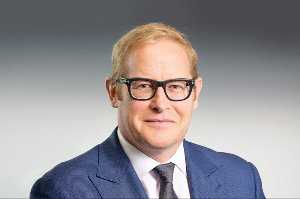Why money managers can’t ignore the planet amid an ESG backlash
The financial services sector’s biggest mistake would be to think it is merely a bystander to the impacts of a changing climate, according to the former head of the Guardians of the NZ Super Fund Matt Whineray.
Monday, May 26th 2025, 6:20AM  2 Comments
2 Comments
by Kim Savage

The financial services sector’s biggest mistake would be to think it is merely a bystander to the impacts of a changing climate, according to the former head of the Guardians of the NZ Super Fund Matt Whineray.
“People say to me ‘oh, I'm stuck in traffic’. You're not stuck in traffic. You are traffic. You are traffic. That's what we are.”
Whineray was chief executive at the Guardians of the Super Fund until last year and now chairs wealth management group First Cape, as well as advising the government’s climate adaptation committees and an Irish sovereign wealth fund.
It is a challenging time for responsible investment, Whineray told attendees at Harbour Asset Management’s Responsible Investment Forum in May, with extreme weather events coupling with political polarisation of sustainable finance globally.
“ESG is being weaponised against investors and managers and countries, in particular, in the US, but not only in the US.”
“ESG is being weaponised against investors and managers and countries, in particular, in the US, but not only in the US.”
“But these investors are looking only to do the sensible thing, which is to incorporate these considerations into investment decisions, because they are financial, they matter.”
Everything is financial, says Whineray, and investors must continue to turn their commitments into action.
“There's always going to be pushback. There will always be different views.”
“When we created our climate change strategy at the Guardians, we may not have known what the destination is or which pathway we're on, but I knew enough to know that bit (climate change) is really, really one way, and that gave us enough confidence to say in the context of all of this uncertainty, this is the right thing to do from a portfolio perspective, from an investment decision perspective.”
Investors big and small have a role to play
Matt Whineray says his experience at the Guardians proved it is possible for investment managers to incorporate ESG standards without significantly reducing their market exposure.
But markets can only do so much of the heavy lifting, says Whineray, with mechanisms based on prices and property rights biased towards maintaining the status quo.
“The systemic nature of these risks means that investors like the New Zealand Super Fund in particular, universal owners with very long horizons, you can't stock pick your way around these problems or diversify away from them if you need large market exposures, they are innate to the system.
“So large asset owners need to step up engagement with policymakers and regulators to set the vision, build the structure demand, the disclosures that will help the rest of us compete in a system that's not working against our long term objectives,” says Whineray.
“We need new capital to flow to fund the transition. We need governments and regulators to act as well.”
| « Who will win the Ethical and Impact Investment Awards? | Harbour ponders drivers of ESG pull back » |
Special Offers
Comments from our readers
Sign In to add your comment
| Printable version | Email to a friend |




1) Doesn't identify the issues.
2) Can't measure with any certainty what will happen if we don't act.
3) Can't measure if we do act.
The truth is, we still don't understand climate change. If we're talking about the reduction of the use of plastics, deforestation, cleaning up the oceans, or reducing our growing dependency on pharmaceuticals, you would have me taking this seriously. But I don't suppose there's any money to be made in these issues.